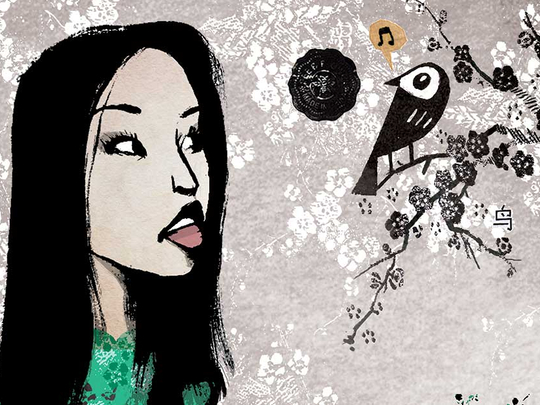
Do Not Say We Have Nothing
By Madeleine Thien, W.W. Norton & Co, 480 pages, $27
If you are walking straight into a headwind, it is a triumph simply to keep yourself upright. Wittgenstein wrote about this with what looks like staggering foresight in 1930: that in a time of cultural impoverishment, “the strength of the individual is wasted through the overcoming of opposing forces & frictional resistances”.
This pointless dissipation of energy and talent perfectly describes the horrors that befell classical musicians during the Chinese Cultural Revolution. The music they loved was forbidden. Their instruments were destroyed. They were tortured and humiliated, accused of treachery and vanity and dispatched to work in the farms and factories of the hinterlands. Their virtues — their virtuosity — were brutally recast as moral weaknesses and a national threat.
The most they could do was protect whatever frail, ghostly sense of identity they still had. It drove many to suicide. And it wasn’t just artists who suffered. Keeping two sets of selves was unbearable for millions. As one of the characters rhetorically asks in “Do Not Say We Have Nothing”, a new novel by Madeleine Thien: “What was misfortune but the quality of existing as something, or someone else, inside?”
“Do Not Say We Have Nothing,” shortlisted this year for the Man Booker Prize, is Thien’s third novel. It is a beautiful, sorrowful work. The book impresses in many senses: it stamps the memory with an afterimage; it successfully explores larger ideas about politics and art (the mind is never still while reading it); it has the satisfying, epic sweep of a 19th-century Russian novel, spanning three generations and lapping up against the shores of two continents.
To give a sense of just how seductive Thien’s style is, here are the novel’s opening lines: “In a single year, my father left us twice. The first time, to end his marriage, and the second, when he took his own life.”
And so the story begins: Li-ling, whose English name is Marie, is a Chinese-Canadian mathematician recalling for us the mystery of her father’s sudden departure and suicide when she was 10 years old. The year was 1989, and his death roughly coincided with the massacre in Tiananmen Square, although he was in Hong Kong at the time. (He jumped from a ninth-floor window.) Two months later, Marie and her mother received a letter from a woman in China asking them to provide shelter for her daughter, Ai-ming, who had gotten in trouble during the demonstrations.
Marie and her mother were hardly selected at random. Ai-ming’s father, a composer named Sparrow, mentored Marie’s father, Kai, back in the 1960s, when they were at the Shanghai Conservatory of Music together. Kai had never spoken of this to his daughter. She knew her father had played piano for Mao Zedong, but her home did not even have a piano.
Slowly, Marie pieces together her father’s history and his country’s — through Ai-ming’s stories, through her own research and (most obliquely) through a series of notebooks found among Kai’s personal effects called the Book of Records, a piecemeal novel that was copied, amended and updated each time it came into the possession of another steward. The radical, forbidden book was passed along in secret, generally to “resistance fighters, spies and dreamers”, always embedded with clues about that particular person’s circumstances and whereabouts.
The larger saga unfurls like silk — and proves similarly resistant to knots, a testament to Thien’s storytelling skills.
At the novel’s heart are Sparrow, Kai and Zhuli, a magical triumvirate bound together by their love of classical music and one another. Kai is a tough orphan from the provinces and a gifted pianist. Sparrow, his teacher, is a shy composer. Sparrow’s cousin Zhuli, a teenage girl 10 years his junior, is a violinist and charming life force. “When his cousin played his work,” Thien writes, “it was as if she sifted the dust away, lost the notes and found the music.”
The background of “Do Not Say We Have Nothing” pulses with music. Thien has that rare, instinctive sense of what it’s like for a person’s brain to be a hostage to its inner score — the call inside these characters’ heads is always louder than the call of the outside world, most fatally that of the Communist Party — and her observations about Bach and Prokofiev, Shostakovich and Debussy are some of the book’s sweetest pleasures, as are her ruthless critiques of musicians. (Zhuli’s assessment of a gorgeous-but-bloodless fellow violinist: “She played Beethoven as if he had never been alive.”)
But slowly, sentiment begins to shift at the Shanghai Conservatory of Music. Students began writing essays asking, “What good is this music, these empty enchantments, that only entrench the bourgeoisie and isolate the poor?”
Zhuli, Kai and Sparrow each make different choices about how to survive the violent assault on their identities, not one of them happy, all of them worthy of a dirge.
Thien captures painfully well the depersonalisation and numbness of living through the Cultural Revolution, particularly the “day-to-day insincerity” of casual conversation, larded with perfunctory praise for the party and Chairman Mao. (It sounds as if it’s coming from a Communist Twitter bot.) Her depictions of the Red Guard’s brutality are graphic and difficult to read: Zhuli’s parents, property owners, are trussed like chickens, beaten and sent to re-education camps.
The novel culminates, perhaps inevitably, with the protests in Tiananmen Square. It’s a virtuoso stretch of writing, rendered with a blue-flame intensity, blazing and tactile and full of life. Noodle sellers, exhilarated, are giving away food. (Thien pulled this from the historical record; her novel has endnotes.) A burning mattress “flew in slow motion on to an army truck”. Sparrow crumples under the weight of a heavyset worker who has been pierced by a bullet.
Even before the tanks roll in, the reader is left to wonder if history is simply destined to repeat itself. One father of a student complains to Sparrow: “These kids think it’s all up to them. They have no understanding of fate.”
It’s a possibility Thien examines throughout the novel: “How time is bent and elastic and repeated.” But the Book of Records, with its constant emendations, suggests another possibility. “I have this idea that ... maybe, a long time ago, the Book of Records was set in a future that hadn’t yet arrived,” Zhuli says.
The implication is that China is still an unfinished work — just like Sparrow’s Symphony No.3, a thing of true beauty, which he was forced to hide in the roof of his house. There it got lost, as did the man he was supposed to become. Yet years later, he found himself able to compose again. But he couldn’t complete that particular piece. The notes he sought were buried in the past.
–New York Times News Service









